God's Discipline
 “Be keenly aware that just as a parent disciplines his child, the Lord your God disciplines you. 8:6 So you must keep his commandments, live according to his standards, and revere him.” — Deuteronomy 8.5 & .6
“Be keenly aware that just as a parent disciplines his child, the Lord your God disciplines you. 8:6 So you must keep his commandments, live according to his standards, and revere him.” — Deuteronomy 8.5 & .6
Status or Substance
 Be careful not to display your righteousness merely to be seen by people. Otherwise you have no reward with your Father in heaven. Thus whenever you do charitable giving, do not blow a trumpet before you, as the hypocrites do in synagogues and on streets so that people will praise them.
Be careful not to display your righteousness merely to be seen by people. Otherwise you have no reward with your Father in heaven. Thus whenever you do charitable giving, do not blow a trumpet before you, as the hypocrites do in synagogues and on streets so that people will praise them.
Luke-Introduction Part Four
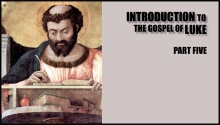
Luke continues his hop-scotch through time, now leading us to an adult John the Baptist in the midst of his ministry. At first glance it appears that Luke is overdoing it with the number of rulers he validates in the first three verses of chapter three. Why should he bother with it? For a couple of reasons. First, to establish the time the events took place (this is a historic record, after all). Second, the benefactor of the book, Theophilous, would be familiar with these rulers if not personally then by reputation. This firmly establishes the time and historicity of John’s ministry.
At Lake Gennesaret

When reading the New Testament gospels, it is easy to get caught up in watching Jesus. He is the main character, after all, and the one doing all the miracles. If you are a mature follower of Christ, I think it can be instructive to look at everyone else at least every once in a while. For example, we find in these first eleven verses of chapter five that life in the first century AD is not all that unlike life in the 21st. Simon Peter and his brother Andrew are in business with brothers James and John in the fishing industry.
Family Discipline
 “Be keenly aware that just as a parent disciplines his child, the Lord your God disciplines you. 8:6 So you must keep his commandments, live according to his standards, and revere him.” — Deuteronomy 8.5 & .6
“Be keenly aware that just as a parent disciplines his child, the Lord your God disciplines you. 8:6 So you must keep his commandments, live according to his standards, and revere him.” — Deuteronomy 8.5 & .6
Luke-Introduction Part 2
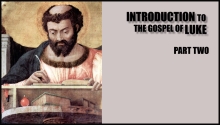
Last time we left off with the angel Gabriel talking with Zechariah in the inner sanctum of the temple. Zechariah’s should have thought before he spoke, a situation I’m sure we’re all familiar with. He questioned the truth of Gabriel’s prophecy regarding he and his elderly, barren wife having a son. The result was the angel made Zechariah dumb until John’s birth. And this is where our story becomes rather humorous. When Zechariah left the temple area, much to the relief of all, he could not tell them what had transpired. This event inspired the world’s first game of charades.
The Galilean Ministry at Nazareth

After completing his introduction to, and proof of, the Messiah being the rightful king of all humanity Luke turns to the gospel proper. This section begins with a “progress report” of sorts (Luke 4.14-15). We see throughout the book of Acts a series of progress reports on the growth of the early church. These reports are marked divisions of the text that can be used to break down the content and outline the book. Luke also includes progress reports in his gospel, but rather than being about the church they are about how people respond to Jesus.
Galilean Ministry, 5.12-16

With four disciples in tow, Jesus set out to visit various towns and villages sprinkled around Galilee. He began his mission by revealing his identity to the people of Nazareth and from that moment forward he has traveled around the region to teach and heal others. It seems every time he finds a few moments alone the crowds find him, and still he receives every person with grace and treats them with dignity and love. Today we find Jesus in a town so small and unimportant Luke doesn’t even bother to name it. The leper Jesus meets there, however, is about to become a part of Biblical history.
Hero of the Faith: Daniel
 Heroes are an important part of a child’s life — and of adults’ too, truth be known. Heroes are those we look up to, those with some level of personal greatness – not only someone who rushes into a burning building to rescue a toddler trapped on the top floor.
Heroes are an important part of a child’s life — and of adults’ too, truth be known. Heroes are those we look up to, those with some level of personal greatness – not only someone who rushes into a burning building to rescue a toddler trapped on the top floor.
Luke-Introduction, Part 3
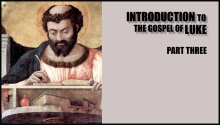
For some reason Luke skips over the wise men, the ruler’s decision to have all boys three years of age and under slaughtered, and the escape to Egypt. Due to the fact that this is an introduction only to the ministry life of Jesus, I imagine he felt he needed to leave it out. An introduction to a book can only be so long. So instead Luke moves us ahead 12 years to the event of his withdrawal from his parents after the feast of Passover to spend time in the temple. The timing, and number of days missing, are significant.
The Galilean Ministry at Capernaum
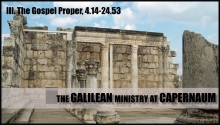
Jesus left Nazareth and continued his journey to Capernaum. Only one week after his near death experience in his home town, we find Jesus teaching once more in a local synagogue. Once more the people were amazed with the sermon, but on this occasion they were more impressed with his style than with the content. We don’t know what passage Jesus taught from, it may have been the same as in Nazareth or it may have been something entirely different. Luke didn’t see fit to provide the details.
The New Covenant
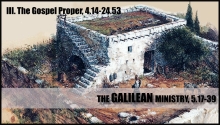
Luke takes us to another nameless town that was small in every way but one: the size of the audience Jesus drew. Jesus’ reputation had grown significantly and word about of his ministry had spread throughout Israel. Some Pharisees and teachers of the Law were sent to look into the new rabbi. They had seen many so-called messiah’s come and go, and a few even made trouble for Israel with Rome. So they came, some even from the temple in Jerusalem, to investigate and report back to their superiors, who were less interested in silencing another false prophet than in keeping their political power.
